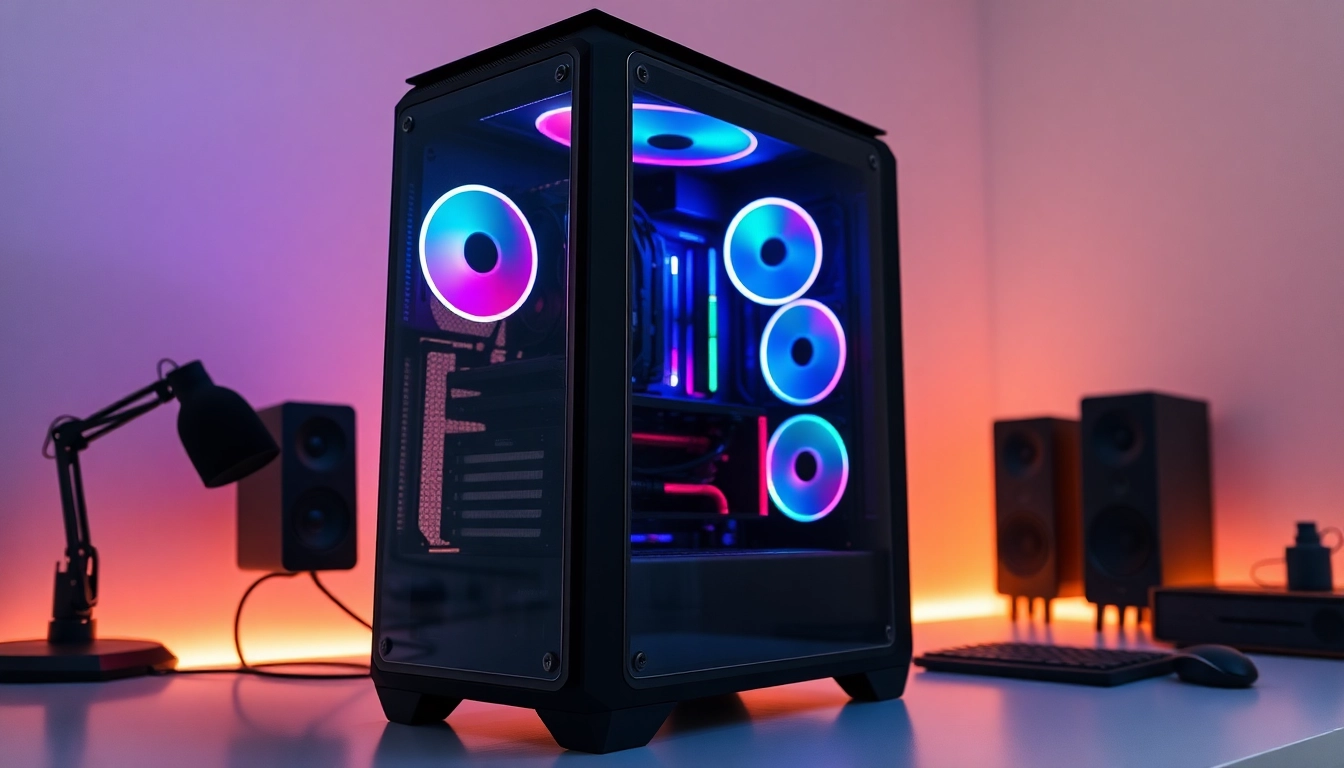Understanding the Role of a PC CASE Supplier
In the world of computer building, a crucial yet often overlooked component is the PC CASE Supplier. These suppliers not only provide the physical enclosures for your components but also influence the aesthetics, functionality, and thermal management of your PC build. A quality PC case is a foundation for any gaming rig or workstation, ensuring that all components are well protected and adequately cooled. This guide will explore everything you need to know about choosing a PC case supplier, the essential features of PC cases, and the latest trends in design and technology.
What Defines a Quality PC Case?
A quality PC case combines several crucial elements that cater to both aesthetic and functional needs. First and foremost, it should be constructed from durable materials such as steel or aluminum, providing strength and stability while also being lightweight for easier handling. A well-designed case ensures that all your components fit securely and that there is ample space for airflow, reducing the risk of overheating.
Another hallmark of quality is versatility; choose a case that supports various motherboard sizes (ATX, Micro-ATX, Mini-ITX) and has enough expansion slots for future upgrades. Furthermore, cable management features—like dedicated routing channels and Velcro ties—allow for a tidy build that optimizes airflow and minimizes clutter.
The Importance of Aesthetic vs. Functionality
While functionality is paramount, aesthetics can’t be ignored in today’s PC building culture. Many users want their builds to reflect their personal style or gaming identity. Factors such as color, lighting options (like RGB lighting), and tempered glass panels allow enthusiasts to create visually striking setups.
Balancing aesthetics and functionality is key. For example, a striking case with poor airflow may lead to overheating problems, while a plain box that lacks visual appeal can detract from the experience. Therefore, it’s vital to choose a supplier that offers both stylish designs and practical features.
Exploring Different Types of PC Cases
The market is flooded with a variety of PC cases, each tailored to different needs and preferences. Some of the most common types include:
- Full Tower Cases: These provide maximum space for components and cooling solutions, making them ideal for high-end gaming rigs or workstations that require extensive hardware.
- Mid Tower Cases: Providing a compromise between size and functionality, mid-tower cases are popular among gamers for their versatility in accommodating various components while remaining manageable in size.
- Mini Tower Cases: Perfect for compact builds, these cases are ideal for small form factor PCs and are often used in home theater PC (HTPC) setups.
- Open Frame Cases: These offer a unique aesthetic and superior airflow by exposing components, making them appealing to custom builders eager to showcase their hardware.
Understanding these types can guide you in selecting the right case for your specific needs, ensuring that it aligns with both your aesthetic desires and practical requirements.
Top Features to Look for in Your PC Case
Cooling Options and Airflow Management
Effective cooling is paramount for maintaining optimal performance, especially in gaming setups where components can reach high temperatures. When evaluating a PC case, consider:
- Fan Configurations: Look for cases that offer multiple fan mounting options. Typically, at least two intake and one exhaust fan position is recommended to create a proper airflow path.
- Radiator Support: For those interested in liquid cooling, ensure the case supports radiators of various sizes. This will allow for efficient cooling while maintaining a clean aesthetic.
- Ventilation Design: Mesh panels or strategically placed vents can enhance airflow and help dissipate heat more effectively.
Material Quality and Durability
The material used in a PC case significantly affects its durability and thermal management capabilities. Most cases are crafted from:
- Steel: Robust and durable, steel cases are ideal for heavier systems but may not offer the best thermal performance on their own.
- Aluminum: Lighter than steel and often better at dissipating heat, aluminum cases provide a premium feel but can be more expensive.
- Plastic: Typically found in budget cases, plastic components may reduce costs but often compromise durability and heat resistance.
Choosing a high-quality case can not only enhance the lifespan of your components but also the overall stability of your build.
Design and Customization Possibilities
Today’s users often seek personalization in their PC builds. High-quality PC cases offer customization options such as:
- Removable Drive Bays: Allowing easy access and flexibility in configuring storage solutions.
- RGB Lighting: Built-in lighting options can create stunning visual effects, enhancing the overall aesthetic.
- Side Panels: Tempered glass panels are popular for showcasing the internal components, while different finishes can cater to various tastes.
Customization possibilities add personal flair to builds while ensuring that practical considerations are not neglected.
How to Choose the Best PC CASE Supplier
Evaluating Reputation and Customer Reviews
One of the first steps in choosing a PC case supplier is evaluating their reputation within the community. Customer reviews and testimonials can provide insights into the quality of the cases, customer service experience, and overall reliability of the supplier.
Make use of online forums, social media platforms, and tech review sites to gauge consumer sentiment. Brands with a strong track record often have responsive customer service and guarantee satisfaction with purchase.
Comparing Prices Across Retailers
Pricing can vary significantly between suppliers. It’s advisable to compare prices and features across several retailers to ensure you’re getting the best possible deal. Pay attention to sales, discounts, and bundle offers that may provide additional value.
Additionally, consider shipping costs and return policies as hidden factors that can impact overall pricing. Always read the fine print to avoid surprises later.
Understanding Warranty and Support
A solid warranty and customer support structure is essential when selecting a PC case supplier. Quality manufacturers often offer warranties that cover defects in materials and workmanship. Understanding the terms of the warranty will help protect your investment.
A responsive customer support team can make a significant difference if issues arise. Brands that provide accessible contact options and helpful service can increase the likelihood of a satisfactory resolution.
PC Cases for Different Use Cases
Gaming vs. Professional PC Builds
The choice between gaming and professional PC cases often boils down to two primary factors: aesthetics and functionality. Gaming cases tend to feature vibrant designs, RGB lighting, and enhanced cooling capabilities to withstand intense gaming sessions, while professional builds often focus on understated elegance, effective airflow, and quiet operation. Depending on your primary use case, selecting a case that reflects your needs will ensure the optimal performance of your components.
Choosing Cases for Small Form Factor Builds
Small form factor (SFF) builds are becoming increasingly popular for users who want compact yet powerful systems. When choosing a case for SFF builds, consider:
- Compatibility: Ensure that the case can accommodate smaller components and has the necessary mounting points for mini-ITX motherboards.
- Cooling Solutions: Like traditional builds, SFF cases need good cooling; look for case vendors that support additional cooling or come with pre-installed fans.
- Maximize Space Utilization: Cases designed for SFF builds should effectively utilize internal space to ensure all components fit without compromising airflow.
The Best PC Cases for Budget Builds
Budget builds require a careful balance of cost and quality. When selecting a case for a budget PC, keep the following in mind:
- Cost-Effective Materials: Look for cases made from lower-cost materials without sacrificing necessary features, such as cooling and storage options.
- No Frills: Many budget cases offer necessary functionality without extra bells and whistles, focusing on the basics such as sturdy construction and airflow.
- Space for Upgradability: Ensure that the case allows for future upgrades; having additional slots for fans or drives can extend the lifespan of the system.
Identifying cases that offer the best features for the price will ensure you get the most value from your budget build.
Trends in PC CASE Design and Technology
RGB Lighting Innovations
The rise of RGB lighting has transformed PC aesthetics. With customizable colors and effects, RGB lighting isn’t just about looks—it can enhance the overall user experience. Suppliers are increasingly offering cases with integrated RGB lighting systems, allowing users to synchronize their lighting with their other components for a cohesive build.
Sustainable Materials in PC Cases
As sustainability becomes a global priority, more manufacturers are adopting eco-friendly practices. This includes using recycled materials in case production and emphasizing energy-efficient manufacturing processes. Consumers are increasingly looking to support brands that align with these values, making sustainable cases a key trend in the industry.
The Shift Towards Modular Designs
Modular cases are gaining popularity, allowing users to customize their builds more easily. This design approach enables users to swap out components like panels or brackets, facilitating easier upgrades and modifications. With a focus on personalization and flexibility, modular cases are leading the way in innovative PC design.



